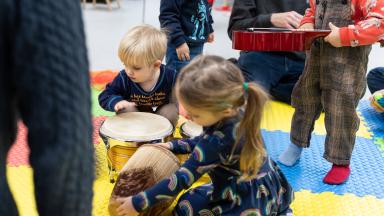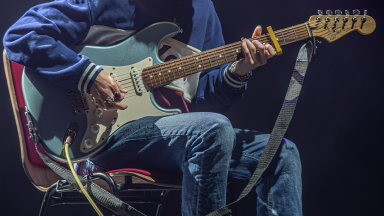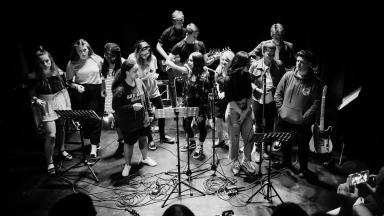Decolonisation: Language and the Music Curriculum
Over the last two IDEA Working Group sessions, the Youth Music staff team have explored two areas within the wider decolonisation movement: decolonising language and the music curriculum.

Remi is a brown mixed-heritage woman of working-class background. Her Jamaican grandparents were invited to England to help rebuild it post-WW2, known as the Windrush generation. They filled her life with music from the get-go. On the occasional weekend you can find her rummaging through her grandad’s record collection or watching her mum parade the south coast with the local samba band.
Remi is also Youth Music’s Insights Manager and Chair of the IDEA (Inclusion, Diversity, Equality and Accessibility) Working Group.
I remember multiple music lessons in school dissecting Eminem’s ‘I’m Not Afraid’. We were learning about rap and hip-hop, which are genres of Black origin.
I still vaguely remember some chord progressions in the song, but had to teach myself outside of the classroom that hip-hop is an art form born from intercultural innovation, protest and a sharp tool for social justice. Why weren’t we focusing on Dr. Dre, the mentor behind Eminem?
I explore these kinds of questions with the Youth Music staff team as the chair of our IDEA (Inclusion, Diversity, Equality and Accessibility) Working Group. Together, we have discussed two areas within the wider decolonisation movement: decolonising language and the music curriculum.
In this blog article, I have included various authors, experts, creatives and resources throughout that I encourage you to explore. They’ll help you gain a holistic sense of the movement and the diamond mine that is music which originates from, and is inspired by, the Global Majority communities in the UK.
Decolonising language and the music curriculum – what does that mean?
Decolonising language is the process which includes identifying and transforming language (words, phrases, and expressions) to challenge and remove the historical, cultural and power dynamics associated with colonialism and imperialism.
This language has historically been used to oppress, marginalise and disempower. It perpetuates a power dynamic where the coloniser’s language or culture is dominant. It can be overt or subtle. It is also the recognition of indigenous language which may have been suppressed during colonial rule e.g. Australian Aboriginal languages, Tagalog, Cebuano and other Philippine languages, and Irish.
Decolonising the music curriculum is a movement to overhaul music education, to ensure it provides an inclusive curriculum that represents a wider range of composers and artists than is currently offered on the typical syllabus. In a nutshell, the wider decolonisation movement is addressing the Eurocentricity found in local and national curriculums, as The Black Curriculum explains.
This movement does not seek to negate the impact or diminish the value of white composers or artists who have historically dominated repertoires, curriculum and the classroom. It’s the critical examination of who has held and currently holds power, how that imbalance has affected whose voices and ideas are taught in schools, and how normative value can be redistributed across artists of all cultural backgrounds in line with the true extent of their contribution to this art form.
It’s not a project or task, it’s a mindset to be applied across the approach to education which will fortify students as modern, globalised people.
- Artists call for greater focus on black British music in schools by Jameel Shariff, NextGen creative and Youth Music Awards 2023 host, BBC
- Black and British: A short, essential history by David Olusoga (reading age: 7 - 12 years) on wokebabies.com
- Natives by Akala on afroribooks.co.uk
- Their commitment to their native tongue, doing things their own way, and reshaping the narrative of modern Belfast remains their top priority: Kneecap: for the culture
- The Music Is Black: A British Story V&A East, Stratford, London, 2025, tickets available soon
We didn’t appear out of thin air / We live here
- Bob Vylan
Here’s a story that demonstrates just how crucial decolonising the music curriculum is. Back in 2021, the qualifications provider Edexcel removed Courtney Pine from the A-Level specification, which faced immediate challenge from students and teachers alike. Pine is an esteemed jazz musician and was the sole Black composer on the syllabus. Why were his works removed?
Pearson Edexcel initially defended their decision, citing feedback from teachers that the volume of work was too high. But after an outcry, they reinstated Pine’s work and said that “as a learning company and qualifications provider, we agree entirely that pupils should study music by composers from diverse cultures and backgrounds.”
To me, this is a good example that a diverse offering, a representative curriculum rich in culture is not proactively provided by decision-makers. Part of the movement to decolonise the music curriculum is to examine who is assessing skill and how they go about it.
What are the power dynamics at play and how far are profit-driven decisions restricting the diversity of the curriculum?
- Why the new gospel music grades are so important by Nate Holder
- Why I had to turn down Band Aid Fuse ODG in the Guardian
- Time Come: Selected Prose by Linton Kwesi Johnson on afroribooks.co.uk
- We didn’t appear out of thin air / We live here playlist, small selection of the Global Majority's impact on modern British music (from mid-90s)
Book smart with the bars but I never learnt that from school / 16 doing up radios sets I was spinning up all them fools
- Little Simz
During one of our IDEA Working Group sessions, Youth Music staff members reflected on our own experiences of music education at school. We acknowledged that no one aspect of our identity or background can determine our experiences.
If you studied music in school, college/sixth form or university, or you know of any young people who currently are, ask yourselves the following questions:
- Do you remember feeling like your cultural background was represented in the syllabus?
- If you learnt an instrument, do you feel that non-Western or Global Majority musical traditions or instruments were integrated into your education?
- Did the musical education you received encompass not only technical skill development, but also the exploration of personal expression and creativity?
These questions aren’t intended to produce a binary answer, but are useful to reflect on how, where, what and who we learn music with can impact your development as an individual and musician. We discussed various shared themes across our experiences of music, including:
- Being provided predominantly Western music whilst learning drums, and not feeling like the history of the instrument and its variations across cultures were adequately explored
- Music theory, which was experienced as rigid, restrictive, Western-music oriented and framed as necessary to access higher music education (see ‘Music Theory and White Supremacy’ video series by Adam Neely)
- A focus on sightreading being a required skill. But is the skill of aural storytelling and teaching, often found in music from the Global Majority, also valued?
- Schools, colleges and teachers limited by exam boards’ decisions in what they can provide students with in the classroom. Some decisions by exam boards, who can be profit-driven and private companies with international influence, are seen as rigid and not inclusive
Awareness days such as National Windrush Day (22nd June) and Black Music Month in the US (or African American Music Appreciation Month) encourage us to take a moment to celebrate and focus on the permanent impact these communities have made throughout our cultures.
But surely embedding learning of diverse musical worlds and their origins in the curriculum, alongside other exposure and learning events such as awareness days, is much more likely to reinforce the next generation’s understanding of the historical, political and social impact of music from the Global Majority.
- ‘Lovers Rock’ episode, Small Axe (2020) on BBC iPlayer, directed by Steve McQueen.
- Notting Hill Carnival (1976) on BFI Player, directed by Tony Kaye.
- White Riot: The music activists who took on racism (2019) on BFI Player, directed by Rubika Shah.
I done a scholarship for the kids, they said it’s racist / That’s not anti-white, it’s pro-black
- Stormzy
We are proud to announce a new partnership between Youth Music and Black Lives in Music. This collaboration marks a significant step towards our shared vision of fostering a more inclusive, diverse and equitable industry. Together, we aim to empower Black, Asian and Ethnically Diverse musicians to realise their aspirations, using evidence and insight to campaign for the resources, opportunities and support they need to thrive.
"We are thrilled to be working in partnership with Youth Music. Their work, energy and values are in direct alignment with those of Black Lives in Music. Partnership and advocacy are key facets that underpin our strategic approach. This very significant partnership will help to champion the musicians who are so often unseen and unheard. Through this collaboration, I'm confident our two organisations will drive transformational change to the benefit of many creative talents whose voices deserve to be championed."
- Roger Wilson, Co-Founder and Director of Operations, Black Lives in Music
How far does musicality start at home? And how far does a musical home environment nurture inspired, skilled and resilient musicians? Our recent research, Sound of the Next Generation, found a trend for inherited musicality and passion for music is particularly common in Global Majority households where around three in four parents make music, compared to half of white parents. They are more likely to support children learning an instrument, and champion listening to the music of their culture or heritage. This strong musical foundation in Global Majority backgrounds leads to a higher proportion of children who make and write music. Read more in the Sound of the Next Generation report here.
- Black Lives in Music presents Classically Black a day of events exploring the cutting edge of classical music, Kings Place, London, 19th October 2024, paid ticket
- African Night Fever based in and around Brighton and the South East, events all year round
- Art Not Evidence: Issues and Implications of Prosecuting Rap
- Musical Truth: A Musical Journey Through Modern Black Britain by Jeffrey Boakye on roundtablebooks.co.uk
- The Kanneh-Masons: meet Britain's most talented musical family on Classical Music
So don’t tell me that grime shouldn’t be the music that man’s putting out /
If you don’t know about fucking up shows /
Bringing hundreds of supporters to the videos /
Spitting brand new bars nobody knows /
Still everybody in the room up on their toes /
Room smoked out even though I don’t smoke /
Forget my bars and freestyle, I don’t choke /
Been doing this for over ten years so shhuuut yuh mout’ – ‘llow it!
- JME
We need to diversify and decolonise the music taught in schools at a faster pace. It’s time to expand far beyond engrained traditional Western systems and approaches. The curriculum is slowly becoming more inclusive, representing a wider range of composers from around the world. This is crucial to ensure the next generation feels their cultural background is represented. It will also equip all young creatives with the resources they need to broaden their musical knowledge in an increasingly interconnected world.
Music education is a focus area, but what about drama, art or history? How can we reimagine the teaching of STEM subjects? Imagine the inspired, informed and equipped generation the so-called modern education system would produce if there were proportionate focusses on both how the evolution of Black British music has produced world-acclaimed genres such as jungle, grime, and UK garage, as well as the historical impact of “Henry VIII duppying bare wives”*.
- Why are UK radio stations ignoring Black British music to play recycled American rap? Elijah in the Guardian
- Sounds of Black Britain podcast by The Black Curriculum
- The Black Curriculum also create playlists reflecting each episode, see their E5 tracklist: Black British Women in Music
- *For Black Boys Who Have Considered Suicide When the Hue Gets Too Heavy

Read next...
IDEA hub
We believe that music should be Inclusive, Diverse, Equitable, and Accessible. We call these principles 'IDEA' for short. Want to improve inclusion, diversity, equity and access in your organisation? Check out our self assessment survey to help you think through what you’re doing well, and what could be improved. We've also compiled additional resources to inspire and shape your IDEA journey.
Let’s Talk About the Class Ceiling in Music
The creative industries in the UK have a problem with working-class representation. How can we help to build a music industry that better reflects our society?
Funding
Discover funding options available with Youth Music.



